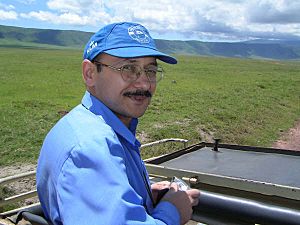Dmitri Bondarenko facts for kids
Quick facts for kids
Dmitri Bondarenko
|
|
|---|---|

Dmitri Bondarenko in Tanzania, April 2005
|
|
| Born | June 9, 1968 |
| Nationality | Russian |
| Alma mater | Moscow State University |
| Known for | contributions to anthropology and African Studies |
| Awards | Main academic awards: Anniversary medal for 300 years of the Russian Academy of Sciences (2024); Nikolay Miklukho Maklay prize for his great work in anthropology (2023); Grants for young scientists (2008, 2009); European Academy prize for young scholars (1997); State awards and titles: Medal of the Order "For Merit to the Fatherland" (2024); Labor Veteran title (2015); Medal "In Commemoration of the 850th Anniversary of Moscow" (1997) |
| Scientific career | |
| Fields | cultural anthropology, political anthropology, African Studies, world history |
| Institutions | Institute of Oriental Studies, Russian Academy of Sciences; National Research University Higher School of Economics; Russian State University for the Humanities |
Dmitri Mikhailovich Bondarenko (Russian: Дми́трий Миха́йлович Бондаре́нко; born June 9, 1968) is a Russian expert who studies people and their cultures. He is an anthropologist, a historian, and an Africanist. This means he learns about human societies, past events, and the many cultures of Africa.
He has traveled to many African countries for his research. These include Tanzania, Nigeria, Benin, Rwanda, Zambia, and Uganda. He also studied Black communities in Russia and the United States.
Dmitri Bondarenko holds important positions. He is a Vice-Director for Research at the Institute of Oriental Studies of the Russian Academy of Sciences. He also leads the Department of Anthropology of the East there. He is a main researcher at the Russian Academy of Sciences. He directs the International Center of Anthropology at HSE University. He is also a full professor at the Russian State University for the Humanities.
He has been a visiting scholar at universities in the United States, Germany, and France. He has given guest lectures in many countries, including Russia, the United States, Egypt, and Tanzania. He helps lead the Africanist Network of the "European Association of Social Anthropologists". He also helped start and edit the journal "Social Evolution & History".
From 1990 to 2024, Bondarenko worked at the Institute for African Studies of the Russian Academy of Sciences. He was a Vice-Director for Research there from 2008 to 2024.
Contents
Education and Learning
Dmitri Bondarenko finished his first university degree in 1990. He studied ethnography, which is the study of cultures, at Moscow State University. He earned his Ph.D. in 1993 from the Russian Academy of Sciences. He also received a higher Doctor of Sciences degree in 2000 from the same academy.
What Dmitri Bondarenko Studies
Dmitri Bondarenko is interested in many topics. He studies how societies are organized and how they change over time. He looks at ancient societies before modern technology. He also explores the cultures and history of Africa. He examines how different cultures interact today. This includes topics like ethnic groups, race, religion, and people moving to new places. He focuses especially on Africa and people of African descent around the world.
How Societies Are Organized
Dmitri Bondarenko, along with Andrey Korotayev, came up with an idea called homoarchy. This idea helps us understand how societies are structured. They compared it to heterarchy.
- Heterarchy means that different parts of a society can be ranked in many ways. Or they might not be ranked at all. Think of a group project where everyone has different skills. Sometimes one person leads, sometimes another.
- Homoarchy is the opposite. It means that parts of a society are ranked in a very strict way. It's hard to change this ranking without completely changing the whole society. Imagine a very strict army where everyone has a fixed rank.
Bondarenko used the ancient Benin Kingdom as an example. He developed the idea of a "megacommunity." This is a special type of very complex society that is not a state. It's a large society that stays together based on communities, not a central government.
He also studies how states first began. He looks at how family ties and living in certain areas shaped early societies. He also examines how beliefs and ideas changed as societies grew.
Understanding Globalization
Dmitri Bondarenko believes that globalization is mostly about culture. Globalization is the way cultures, ideas, and goods spread around the world. He argues that it's not a new thing. He thinks it has been happening throughout human history. He suggests that globalization can be successful if different local cultures and civilizations work together like a "federation."
 | George Robert Carruthers |
 | Patricia Bath |
 | Jan Ernst Matzeliger |
 | Alexander Miles |

